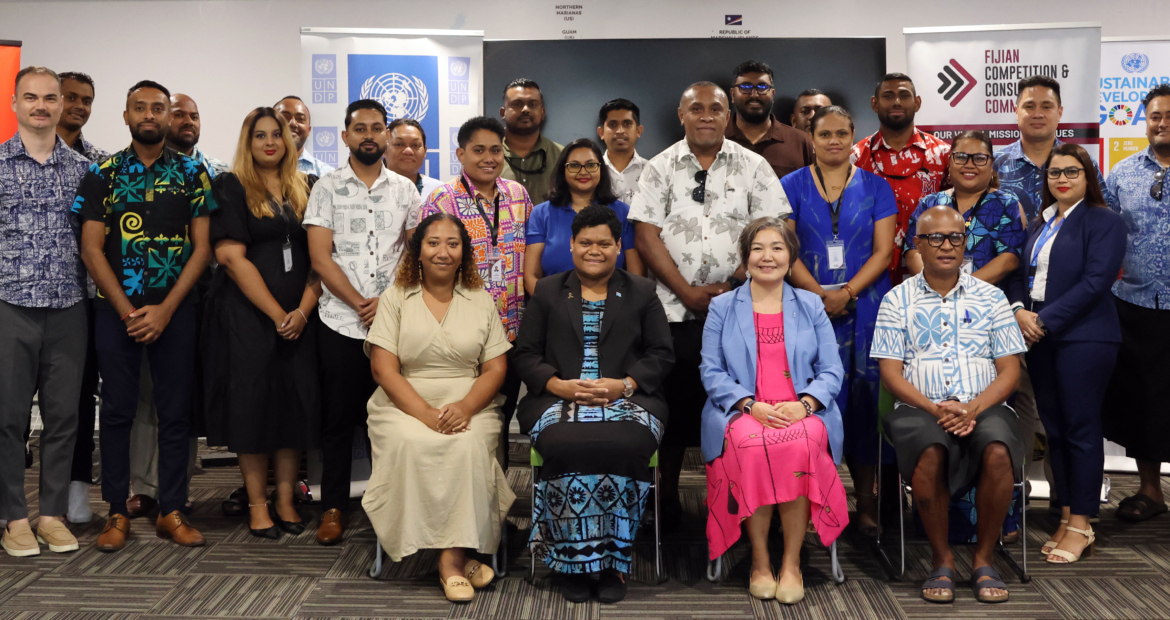Suva, Fiji – The UN Development Programme (UNDP) and Fijian Competition and Consumer Commission (FCCC) today signed Memorandum of Understanding (MOU) and a Letter of Agreement (LOA) marking a significant step forward in institutional gender transformation in Fiji and advances inclusive development outcomes in Fiji.
The MOU signing ceremony formalised FCCC’s commitment to implementing the Gender Equality Seal for Public Institutions – a globally recognised certification initiative led by UNDP. This partnership positions FCCC as the first public institution in Fiji to embark on this transformative journey, reinforcing its role as a regional leader in gender-responsive governance.
This initiative will support FCCC in strengthening its internal systems, policies, and operations to promote gender equality and inclusion ensuring that institutional and regulatory decision-making reflects the needs and voices of all Fijians. It aligns directly with Fiji’s National Gender Policy and its international commitments, including Convention on the Elimination of All Forms of Discrimination Against Women.
Through this initiative, FCCC will undergo a multi-phase process involving internal assessment, capacity building, and external accreditation.

This partnership also compliments FCCC’s regulatory role in the Fiji Rural Electrification Fund (FREF) project. By integrating gender-responsive systems into its oversight of off-grid and mini-grid energy solutions, FCCC is ensuring that women and vulnerable groups are not only protected but empowered through equitable access and inclusive development.
Through the agreement, UNDP in collaboration with Arizona State University, will support FCCC in developing national regulations for rural mini-grids.
The FREF Project plans to electrify 20 rural communities over the next 24 months thereby connecting 6,500 Fijians and 15 schools and health centers to clean, affordable and reliable electricity. It will install 2 megawatts of solar energy to abate 2.92 gigagrams of carbon dioxide equivalent while creating capabilities for tele-health and tele-education using satellite data connectivity.
This agreement under FREF also supports the Fijian Government’s broader energy and climate ambitions, by putting in place the regulatory environment necessary to scale rural electrification in a sustainable and inclusive way.

FCCC Chief Executive Officer, Senikavika Jiuta said:
“By embedding gender equality within our own operations, we ensure that our regulatory work, like that with FREF, delivers measurable, empowering benefits to all Fijians, especially women and girls in our most vulnerable communities. We hope our journey inspires other public institutions to join this critical movement.”

UNDP Pacific Office in Fiji Resident Representative, Munkhtuya Altangerel said:
“This is the first time in the Pacific that a public institution has voluntarily raised its hand to pursue Gender Equality Seal certification. FCCC is setting a new benchmark – not just for Fiji, but for the region – demonstrating that public institutions can lead by example in embedding equality and inclusion into their very core.”
This integrated approach plays a crucial role in advancing three key Sustainable Development Goals: it promotes gender equality in line with SDG 5, supports access to affordable and clean energy as outlined in SDG 7, and strengthens peace, justice, and institutional integrity in accordance with SDG 16.
As FCCC embarks on this transformative journey with UNDP, the partnership stands as a powerful example of how institutional reform can drive inclusive development.
For more information, please contact:
Ashna Kumar, Communications Associate | UNDP Pacific Office | (E) Ashna.kumar@undp.org
Or Jai Kumar, Communications Officer | FCCC | (E) media@fccc.gov.fj

